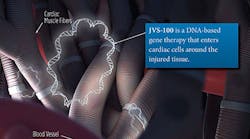While the optimal treatment for heart failure was provided to a group of patients, they were still having symptoms. However when a new drug therapy based in regenerative medicine was given to these patients they showed clinically meaningful improvements in end systolic volumes, end diastolic volumes, ejection fraction and NTproBNP levels.
The drug, produced by Cleveland, Ohio-based Juventas Therapeutics, called JVS-100, is a non-viral gene therapy that expresses SDF-1 and promotes endogenous stem cell repair of the heart in patients with severe heart failure.
"What was remarkable about the improvement is that this drug was given to patients who had heart failures stemming from heart attacks that occurred - on average- about eleven years ago," said Dr. Mark Penn, founder and CMO of Juventas Therapeutics, and director of Cardiovascular Research at Summa Health System in Akron, Ohio.
Penn presented phase II clinical data last month at the European Society of Cardiology- Heart Failure Congress in Athens, Greece.
The field of regenerative medicine, which is the process of replacing, engineering or regenerating human cells, tissues or organs to restore or establish normal function, has come a long way. Penn explained that 14 years ago that stem cell based repairs lacked molecular signals that orchestrated the repairs. "Doing research we asked what drives stem cell repair? We saw that newly injured tissue was sending some signal to ask for it to be repaired. And in 2000 we discovered SDF-1 could aid that signal. Now our theory is validated that the gene therapy is a key factor for recruiting stem cells to the site for any injured tissue."
The therapy showed an 80% chance of a significant decrease in mortality for high risk heart failure patients.
With this success, Penn hopes to start next summer of 2015 on a larger trial of 300-400 patients. When that trial is initiated the company will have to move from manufacturing the drug for clinic studies to a commercial scale. Once the drug has regulatory approval the company will decide where to manufacture.
When asked about the reason for the success of the company, Penn says that "the company has always been driven by data. We had no preconceived ideas that this should work. We designed good trials, looked at the data and that told us where to go."
With regard to the financial side of the business, the company has worked with venture investors. And they have formed partnerships. The company has on-going collaborative research programs with Cleveland Clinic, Center for Stem Cell & Regenerative Medicine, Global Cardiovascular Innovation Center and Summa Health System.



